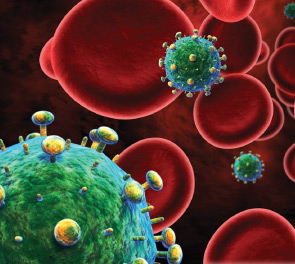
Error: No layouts found

Thanks to antiretroviral drugs, many fewer HIV-infected people experience frank dementia anymore. Nevertheless, more than half of HIV-positive patients treated with antiretrovirals suffer from milder, lifelong HIV-associated neurocognitive disorders, or HAND, caused when HIV-infected white blood cells cross the blood-brain barrier. Joan W. Berman, Ph.D., professor of pathology and of microbiology & immunology, recently received three NIH grants totaling $11 million to conduct research aimed at preventing HAND. She also holds the Irving D. Karpas, M.D., Chair for Excellence in Medical Research.
Dr. Berman and Susan Morgello, M.D., of the Icahn School of Medicine at Mount Sinai, received a five-year, $3.6 million grant to study certain white cells known to be responsible for HAND. They will follow the cells’ migration in HIV-positive patients and study the proteins that regulate their transit across the blood-brain barrier.
Dr. Berman and co-principal investigator Harris Goldstein, M.D., will use a five-year, $3.8 million grant to study interactions among methamphetamines and other drugs of abuse, antiretroviral therapeutics and HIV. Dr. Goldstein is a professor of pediatrics and of microbiology & immunology and directs the Einstein-Rockefeller-CUNY Center for AIDS Research. Such drugs may weaken the blood-brain barrier, enabling HIV-infected white cells to cross it.
Under a five-year, $3.8 million grant, Dr. Berman and David Volsky, Ph.D., of the Icahn School of Medicine will study whether buprenorphine—an anti-addiction drug that works by binding to the brain’s opioid receptors—can prevent or reduce HAND by binding to the opioid receptors of white cells.